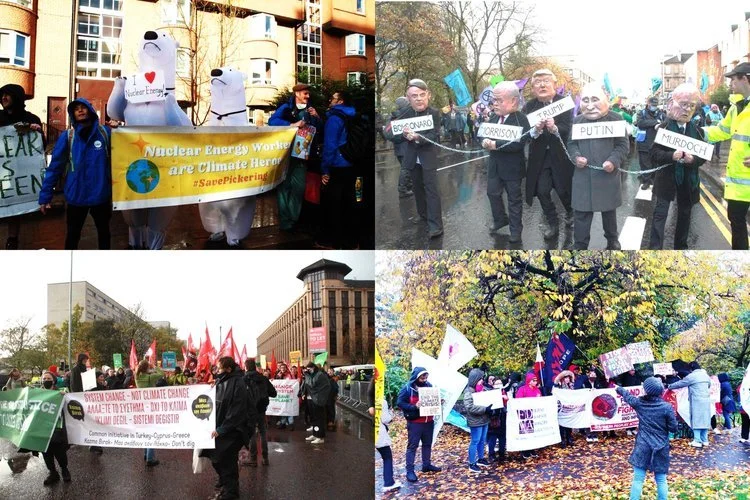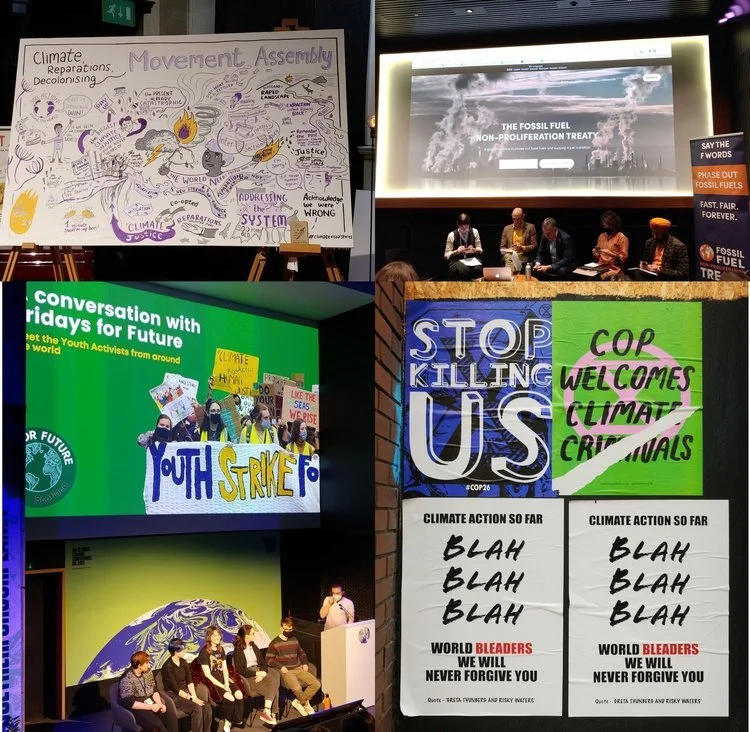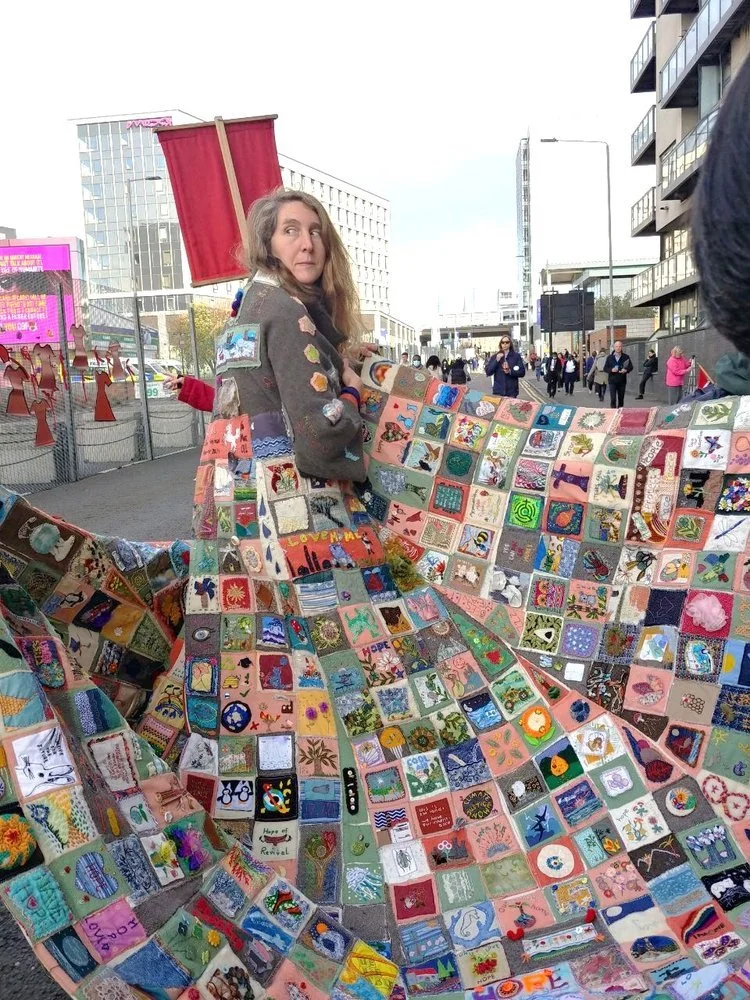The Climate crisis “agenda”, “keeping” is needed
Recently, Son Seok-hee, a journalist in Korea, explained the importance of “Agenda Keeping” in his book called “Scenes”. He says it is necessary for media to raise questions by selecting important agendas and continuously reporting them. So, what is the important agenda to keep for us now?
The 26th UN Climate Change Conference (COP26) held in Glasgow, Scotland, ended on November 13. The meeting, which began on October 31 and lasted for about two weeks, was a meeting where countries gathered and discussed how to "keep" the Earth's temperature rise below 1.5 degrees Celsius. Ahead of the COP26, or during the course of the COP26, agendas on how much carbon emissions should be reduced and how to reduce them were at least mentioned and made the most important headlines
However, it has only been a week since COP26 ended, and news about the climate crisis is hard to find. However, even at this time, the climate crisis is ongoing everywhere. Then, why does the agenda of the climate crisis disappear without being "keeped"?
My conclusion, which I saw inside and outside the COP26 conference hall in Glasgow from November 5th to 10th, is because of the "temperature difference." The "temperature difference" between those who lose their homes due to the climate crisis and those who discuss how to manage this risk for profit, seeing the climate crisis as just one of the risks. The problem is that all decisions are made by the latter, not the former.
At the end of the 13th, the Glasgow Climate Pact was agreed by the Parties as its representative decision. As a result of the agreement, the climate adaptation fund was increased, fossil fuels were mentioned for the first time since the start of the climate change agreement, and the agenda for compensating for climate crisis losses and damages was discussed. However, coal power generation will be “phase down” instead of “phase out”, and each country's greenhouse gas reduction goals(NDCs, nationally determined contributions), which limit Earth's temperature rise to less than 1.5 degrees Celsius, will be re-examined next year, and in fact, immediate action to resolve the climate crisis is still hard to find.
What happened outside the conference hall while these issues were being discussed and decided? On Saturday, November 6, a "Global Day of Action For Climate Justice" rally and march were held in downtown Glasgow, where not only local residents but also people from all over the world took action demanding the urgency of the climate crisis and immediate action right. Although it was a rainy and windy day, more than 100,000 people, including natives, migrants, farmers, young people, peace activists, feminists, residential justice activists, religious groups, extinction rebellion activists, workers, progressive party activists, and ordinary citizens, participated calling for climate justice. The demands of the people on the street were not only diverse, but also very desperate.
Global Day of Action For Climate Justice held in Glasgow, Scotland, on November 6th
There were diverse banners saying "climate justice, right now" to "Stop funding fossil fuels," "Feminists want system change," "Residential justice is climate justice," "Stop greenwashing and act right now," "Just job transition," and "COP26 We're watching you". From young children to old people with gray hair were demanding action for real change immediately.
In addition, from November 7th to 12th, different sessions were held throughout Glasgow as the name of People's Assembly to share and discuss activities, topics and strategies. I have also visited various places to participate in the session of the People's Assembly, but some have already filled. It was unfortunate, but I felt good to see people's high interest. The following is a brief content of the session I participated in.
There are sessions exposing greenwashing in the aviation industry announcing the reduction of greenhouse gases with technologies that have yet to materialize; sessions of the fossil fuel Non-Proliferation Treaty organizations which individuals, and politicians from around the world gather to stop using fossil fuel by using the model of the Nuclear Non-Proliferation Treaty; Fridays for Future in Scotland that teens act to demand climate justcie. Finally, every evening, the movement assembly was held and people gathered to report activities, establish strategies, and gather strength.
The works of the movement Assembly of the People's Movement (upper left), the session of the fossil fuel Non-Proliferation Treaty (upper right), Fridays For Future in Scotland (lower left), and posters posted on the wall with voices of the people (lower right).
In addition, not everyone could enter the COP26 conference hall, but only meeting participants or organizations or individuals registered as observers. At the entrance to the conference hall, various groups and individuals gathered every day with chant, sing, dance, picket to demand people going in to listen to 99% of voices and urge them to make decisions to resolve the climate crisis. An artist I met in front of the conference hall explained that she had walked 900 kilometers from southern England to the front of the Glasgow conference hall.On the way up she met people and they attached small patches to her coat. A small piece of cloth contained a calling for the realization of climate justice. She was recommending people entering the conference hall to try on the coat. Although people could not come directly to Glasgow, she wanted to meeting participant to feel the weight of the voices of those who strongly demanded climate justice.
An artist, who had walked 900 kilometers from southern England to deliver the voices of people's demands for climate justice, is protesting in front of the conference hall.
Before the COP26 meeting, UN Secretary-General Antonio Guterres emphasized the importance of the meeting by saying "an important year that determines success or failure in responding to climate change." This is because now that red alarms are ringing all over the world, climate disasters will inevitably happen if appropriate measures are not set and done. However, on November 1, the World leaders gathered and announced the "upgraded" goal of reducing greenhouse gas emission(Moon Jaein, the president of South Korea also presented a 40% reduction compared to 2018 by 2030) but the COP26 closed without any conclusion.
Around the world, indigenous peoples are losing their homes due to the climate crisis and the extraction of fossil fuels from transnational energy companies, and desperate appeals from children to adolescents feeling “climate anxiety” that there is no future without solving the climate crisis.
However, regardless of the destruction of someone's habitat, the industry exerts influence at the meeting, looking for ways to minimize their losses in response to "climate change" rather than the term "crisis" in the conference hall. Since COP26 ended, this temperature difference may be growing without our interest. That is why we need to fight to win to realize a solution for the 99% and it starts with “keeping” this “agenda”, acting in solidarity, and demanding a solution to realize climate justice.



